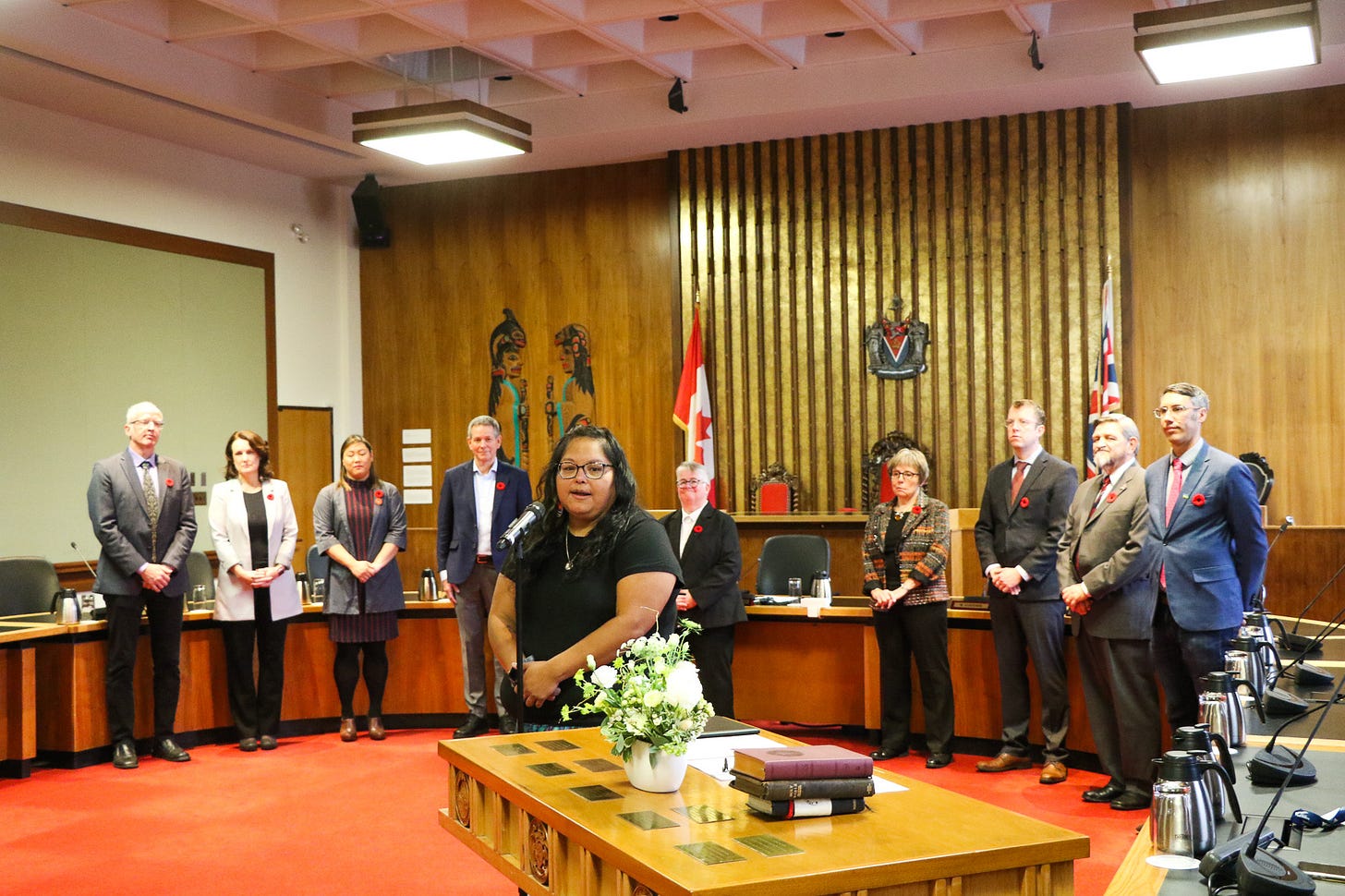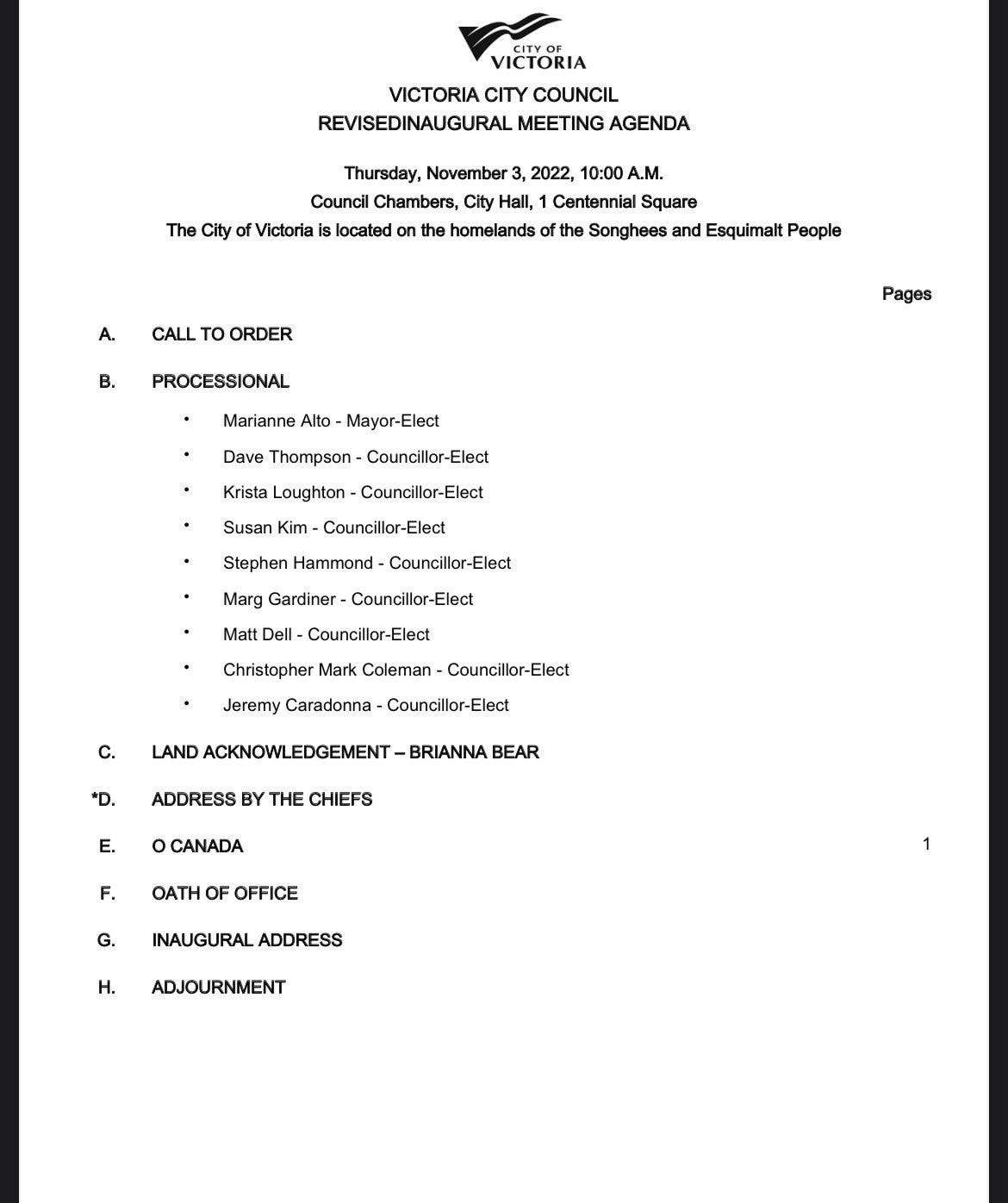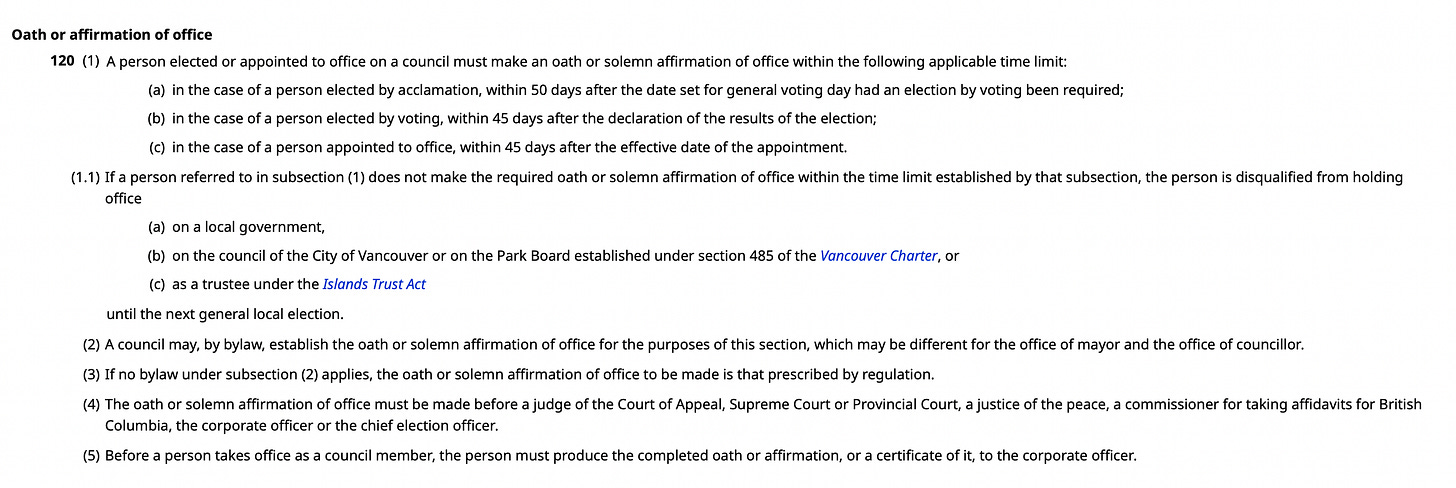Victoria's Oath-of-Office-gate
Past councillors and one mayor have eschewed the monarch in the oath
Today the new Victoria Mayor and City Council were inaugurated during a ceremony at City Hall. The last time this took place was in 2018 and many might recall that then-incumbent Mayor Lisa Helps refused to swear an oath to Queen Elizabeth II. It also happened in 2014 and with councillors in 2011, 2008 and 2002. It was for this reason that many political watchers were waiting to see if anyone would follow the same path in today’s ceremony with our new members.
During the ceremony 6 of the 9 members of Council inclusive of the Mayor did not include the oath to King Charles III. This sparked some err and questions on Twitter as the ceremony ended.
And so I did some digging.
It is important to remember that municipalities are not distinct levels of government in Canada. We have two levels of government defined in our Constitution; the federal government and provincial governments. Each have specific areas of responsibility that are again defined in our Constitution under sections 91 and 92. There are no Constitutional powers or responsibilities assigned to municipalities.
We are just getting this newsletter off of the ground and need as much support as we can get. Please consider subscribing to the newsletter to show your support and get regular updates as they are posted directly to your email inbox.
Municipalities across Canada are creatures of the province. They are created by the province, their powers are delegated by the province (all of them rest with the province from a constitutional perspective) and any requirements of office are defined by the province through legislation and regulation.
In British Columbia, there are two pieces of legislation that serve as the basis of the bulk of creating, defining and providing regulations for municipalities in the province, these are the Local Government Act and the Community Charter. If you ever have any questions over who should be doing what or what municipalities are legally required to do and not do you should first look to these two pieces of what lawyers would call enabling legislation (specifically the Community Charter, that has a lot of this kind of information).
In British Columbia, there are two pieces of legislation that serve as the basis of the bulk of creating, defining and providing regulations for municipalities in the province, these are the Local Government Act and the Community Charter.
And what do these pieces of legislation say about oaths? Well, first of all they are the authority for the oaths, the reason why the ceremony this morning even included an oath. Nothing else compelled council to do this today, just the law from the Charter. It is not a matter of custom, or federal law or just something that happens because we are a constitutional monarchy. The oath is a requirement in the law under section 120 of the Community Charter. If defines who should take the oath and when.
There is also a regulation contained within a schedule of the Charter which provides an example of what the oath should look like. And this is important, Mayors and Council in British Columbia do not take the Canadian Oath of Allegiance (“I swear Allegiance to the King…”) like MPs, MLAs, judges, Canadian Forces members and police officers. The Charter says that they take an Oath of Office which has a specific form and purpose which is different than the Oath of Allegiance.
So what does all of this mean? It means there is no requirement in provincial law (which governs municipalities) for elected local government officials to make the Oath of Allegiance. They are required to take the Oath of Office which is clear in the law.
Where things get muddled in Victoria is that it is clear that we have our own oath written sometime in the City’s history (which is permitted as per section 120 para 2) which states that “[a] council may, by bylaw, establish the oath or solemn affirmation of office for the purposes of this section, which may be different for the office of mayor and the office of councillor.” Now, I could not find a specific City of Victoria by-law that mentions the text of the oath but it is clear that ours references the Crown and includes a statement of allegiance. I wouldn’t put it past out City that we do not have it in a by-law but it has become common practice over a long period of time.
Considering this has been something that has come up in 2018 and now again in 2022, that the majority of elected members opted to avoid the statement of allegiance, and the fact that is not even required through BC law, perhaps it is time for the city to remove the statement from the oath that is used. This would be permitted in the law and would avoid this coming up again in the future.
I would have thought that Lisa Helps would have done some research to change this herself while she was in office considering she is the one who first raised the issue but she was a woman of action, not process (as we all know).
But I would like to know what you think…should all elected officials— even at the local government level— make the Oath of Allegiance? Should Victoria look at wording their future Oath of Office along the same lines as the provincial regulation suggests and not have any reference to the monarch? Does any of this really matter aside from some headlines every four years? Let me know in the comments!
Correction Note: a previous edition of this newsletter said that Lisa Helps started the trend in 2018 when she refused the oath. While there was national coverage of this when it happened, it was pointed out by a reader in the comments that it happened in 2014 with her and some councillors. And again in 2011, 2008 and 2002 with some councillors. We apologize for the inaccurate information.












I have long been fascinated by the structural forms that provide the illusion of sound governance when daily reality reveals quite different modus operandi (more in a general, not criminal, sense). Writing on this (to myself for now) as part of exploring truth and fiction in the concept of "rule of law" as a presumed safeguard in societies. Is there a similar presumption relative to our past Queen? Was her lauded integrity and symbolic presence, etc. a counter to the egregious performance of various governments, or an enabler, a cover? To that question, does the rule of law provide cover for the slide into fascism seen on a world scale? Pointedly, is that ok if we get there following the rules?
Interest from Brian Klaas: https://brianklaas.substack.com/p/to-break-democracy-break-information
Thanks for your thorough and impressive research on this topic Eric.
Personally, I am not a monarchist - a sentiment shared according to Ipsos by about 54% of Canadians:
"Roughly half (54%) agree (20% strongly/33% somewhat) that now that Queen Elizabeth II's reign has ended, Canada should end its formal ties to the British monarchy. This sentiment is down 5 points from 2021, but up from 44% in 2011.Sept 16, 2022"
https://www.ipsos.com/en-ca/news-polls/canadians-conflicted-on-future-role-of-monarchy#:~:text=Roughly%20half%20(54%25)%20agree,up%20from%2044%25%20in%202011.
That being said, I doubt that Canada will ever manage to extricate herself from the Commonwealth Realm and will continue as a nation to swear allegiance to the British Monarchy as our head of state.
Came across this interesting article
https://www.nationalgeographic.com/history/article/how-the-commonwealth-of-nations-arose-from-a-crumbling-british-empire
From which I learned to my surprise, that "the Commonwealth of Nations (54 members)" and the "Commonwealth Realm" (14 members,including Canada) differ.. Only the 14 members of the Realm have British monarch as head of state . (I had until now, mistakenly thought all did)
"However, 14 members still do recognize the monarch. Known as the Commonwealth realms, these countries include Australia, the Bahamas, Belize, Canada, Grenada, Jamaica, New Zealand, Papua New Guinea, St. Kitts and Nevis, St. Lucia, St. Vincent and the Grenadines, the Solomon Islands, Tuvalu, the United Kingdom, and—for now, at least—Antigua and Barbuda."
But... I digress (lol) Just thought you might find some of this interesting.
To return to your question: my answer is that on a municipal level and probably on provincial; I'm not concerned one way or the other, if elected officials take Oath of Allegiance.
I was unclear from your article, and haven't yet looked up - for those who swore Oath of Office - is it a set oath... ? What's the wording? For those swearing Oath of Allegiance, do they also swear Oath of Office?
I certainly attach much more importance to an oath of office (if only we could hold those swearing them, to be accountable....)
And yes, generally, I think it's a once in 4 yrs issue :) I don't think those working to abolish the monarchy in Canada will gain much traction - although everyone (myself included) seems to have an opinion on the matter.
It was interesting to see the split of which newly elected swore the allegiance and which didn't!!!!
Cheers, Maggie